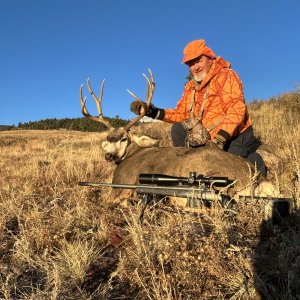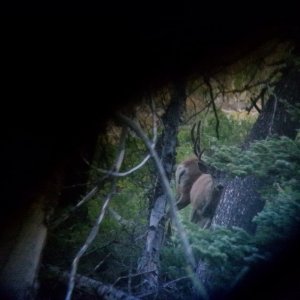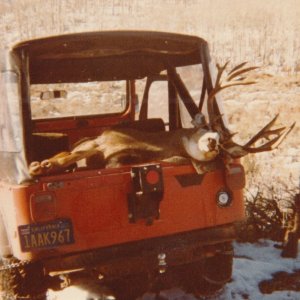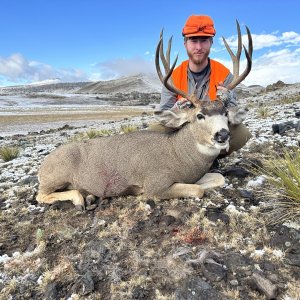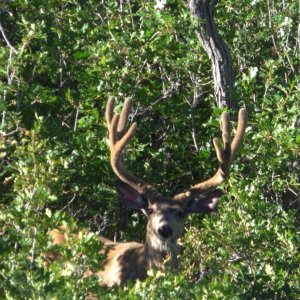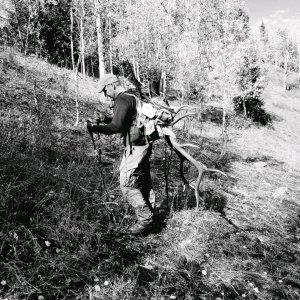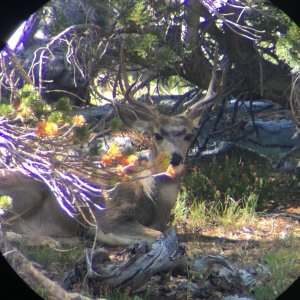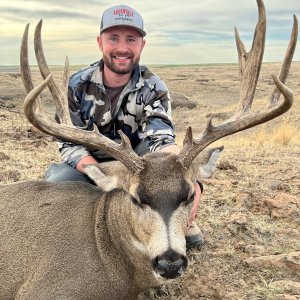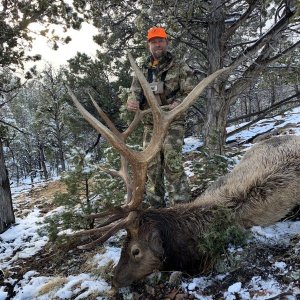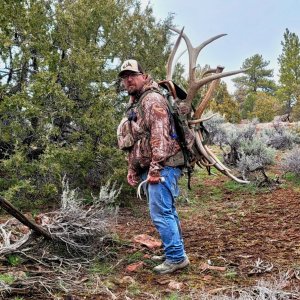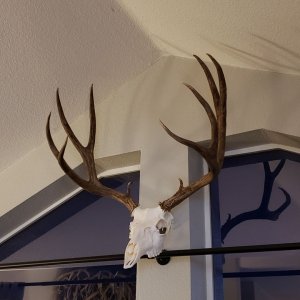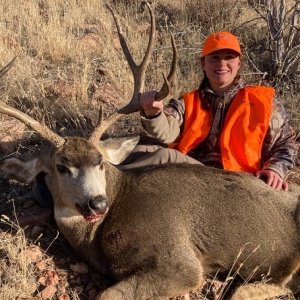BuraNut asked me to copy & paste for him since he does not know how to do this yet. It is 5 pages long so will take up space but he is concerned.
Ranching for Wildlife: A Proposal for Arizona
Prepared By: Manuel Nikel-Zueger
Overview
In Arizona, the quantity and quality of wildlife is not optimal. This is the result of many contributing factors, not the least of which is the imbalanced relationship between the rights of private landowners and wildlife, which is managed by the State Game and Fish Department.
Many landowners, hunters, outfitters, and guides believe that a ?Ranching for Wildlife? program similar to those that exist in other western states is a fundamental step towards creating healthier wildlife with better habitat while fully acknowledging and respecting the property rights of private landowners.
Description of the Problem
Landowners, principally ranchers and other agriculturalists, whose livelihoods rely upon the careful management of natural resources, are encumbered in many places by elk, deer (couse deer and mule deer), and/or antelope. For example, an elk consumes a substantial amount of forage, perhaps seventy-five percent the forage a cow consumes. Deer and antelope consume less, but deer, antelope, and elk all eat the same vegetation that cows eat. Therefore each additional big game animal on a ranch reduces (to a varying extent) the number of cattle that can be run on a ranch. In Arizona, this problem has grown considerably because elk populations have grown substantially in the past two decades. Not only have numbers grown, but elk have expanded into more territory.
Consumption of forage is not the only cost wildlife imposes on private property owners. Elk are the most destructive. They often tear down fences, though deer can also, while antelope either go under fences or between the wires. Downed fences have to be repaired, which incurs material and labor costs, and time is spent finding and returning cattle.
Elk and other wildlife also rely on the improvements that ranchers and other landowners provide for their operations, such as water troughs, dirt tanks (which capture run-off rain water), salt, and protein supplements. Wildlife also benefit from the restricted access hunters have on private land, which can encourage the residence of wildlife.
Landowners want to control the access hunters have on their land in order to ensure that the land is respected. Landowners attempt to minimize unnecessary roads, trash, and even the occasional dead cow or calf killing. In addition, landowners are legitimately concerned about preventing any easements by prescription, which limit the landowner?s property rights and ability to be a steward of the land. Stricter access controls on private lands are largely the result of increased human populations in the state, and increased hunting pressure, both of which have increased trespassing.
Unfortunately, the cost that wildlife, especially big game wildlife, imposes on landowners does not create incentives for progressive steps to manage for wildlife, despite the fact that landowners enjoy wildlife. This is because private landowners have little recourse to the benefits that wildlife could otherwise provide. The benefits of seeing big game wildlife or charging access fees is too small relative to the costs wildlife impose. In fact, Arizona is the only western state where landowners do not receive any form of compensation for damages caused by wildlife.
Making matters worse is that the quality of management provided by the State?s Game and Fish Department is less than satisfying. This view is not only held by private landowners but also by many hunters. Landowners complain about working with Game and Fish, noting generally that most efforts are a waste of time. Many landowners are wary about dealing with the agency because most grants for habitat improvements or other infrastructure improvements that would benefit wildlife are contingent on Game and Fish obtaining public access. With respect to big game hunters, they are given only a short time frame during which they can hunt. Short seasons also mean that hunters are out at the same time, and if they have done their scouting, hunter densities in an area can be high, leading to less enjoyable and less successful hunting experiences. High densities of hunters can also lead to a greater negative impact on the natural resources. In all, management of our wildlife and natural resources, as well as hunting experiences, can be improved.
Some argue that private landowners exercise their private property rights by restricting access while offering hunters either access for a fee and/or guided hunts for a fee. While private property owners certainly can (and some do) receive revenues from such measures, landowners are merely trying to capitalize on their resources in order to stay in business. That landowners are due compensation for damages caused by wildlife is an issue distinct from a landowner?s right to charge access fees on or through private lands. Revenues from access or guided hunt fees never outweigh the costs of damages.
At the heart of this issue is the question of the bundle of rights that belong to private property with respect to wildlife. Do landowners have any right to compensation for the losses they incur as a result of damage done and forage consumed by wildlife, principally big game such as elk, deer, and antelope? The State of Arizona receives all revenues from hunting whereas private landowners go empty-handed while paying many of the costs of providing for wildlife by way of land, forage, water, roads, and other infrastructure. Private Landowners should share in the revenues. Understanding that incentives matter, if private property owners were to have a stake in the hunting industry, they would certainly manage their ranches for both cattle and wildlife.
Ranching for Wildlife: The Idea
A certain number of hunting tags for all big game species that are found on a ranch are given to the ranch (landowner) at the price for which the hunter would purchase them from the state if he had drawn a tag. These tags are completely transferable and saleable. This is a form of compensation to the landowner which gives him a definitive stake in managing the ranch in a way that incorporates wildlife as an essential part of the mix. A Ranching for Wildlife program in Arizona must be an explicit recognition of the right a landowner has to compensation for damages, especially since there is no such recognition in Arizona.
In order to make this program acceptable to the public and to the State Game and Fish Department, the landowner must participate in a ?Wildlife Management Plan? that is specific to the ranch. Annual review by a board comprised of the landowner, a representative from the Game and Fish and an independent third party (perhaps by a qualified professional from the University of Arizona Extension Service) will review progress towards the implementation of the management plan and its effectiveness. In addition, a proportion of the tags allocated to the landowner will be allotted as a public access tag on the ranch.
The Pilot Program
Before a wide-scale program is implemented, a pilot program should be adopted in order for the State to familiarize itself with the program and to identify ways in which the program can be improved. A pilot program would comprise several ranches which are identified as prime candidates with respect to certain criteria such as ranch size and elk populations. The duration of the pilot program is negotiable but a three year trial would allow sufficient time to judge the effectiveness of implementing the program, as well as observing initial results. With this approach, changes could be considered and attempted, perhaps even by adding one or two additional ranches to the program. The pilot program could also be extended an additional year or two if it is believed that more time is needed to make the process more effective. The pilot program would not exceed five years before the policies and procedures become final.
Preliminary Policies and Procedures
? A landowner must have at least 5,000 acres of private land in order to participate.
? Landowners that border one another, none of which own 5,000 acres, can submit an application (if their combined private lands are at least 5,000 acres) that their lands be managed together in one management plan.
? A task force comprised of two Game and Fish Department personnel, two eligible landowners or their representatives, and two University of Arizona Extension Service personnel will draw up and agree on norms, by majority vote, for the application procedure and the method of scientific estimation of big game wildlife populations.
? Each aspiring participant must file an application with the State Game and Fish Department that includes legal description of all participating lands and adequate maps that indicate the topography and the borders of the participating lands.
? The application must include scientific estimates of all big game wildlife that resides on the applicant's lands. The method of estimation approved by the task force must be used by all participants in the program.
? Upon approval of the application, a wildlife management plan that specifies the landowner?s short term and long term objectives and the actions that will be taken to achieve those objectives must be submitted.
? State and federal lands to which a landowner has a lease can be included in the landowner?s ?Wildlife Management Plan.? (Those lands, however, cannot be counted towards the 5,000 acres of private land required for participation.)
? Management of state and federal lands in the Ranching for Wildlife program does not in any way prevent the public from accessing those lands to which they have legal access.
? Upon approval of the wildlife management plan, the applicant will receive a license for the area described in the management plan.
? Licenses are valid for five years. Landowners participating in the pilot program will be licensed throughout the term of the pilot program. As the maximum possible length of the pilot program is five years, all pilot program participants must reapply at the conclusion of the pilot program.
? The number of transferable tags allocated to a landowner for each big game species (antelope, deer, and elk) will be calculated with respect to the number of acres of private property and the number of animals that use the private lands. Specific means of calculating tag numbers will be negotiated by the task force and will be subject to alteration during the pilot program. Because of the nature of transferable wildlife tags and each management plan, all participating landowners will have ranch specific harvests. In other words, there should be some measure of flexibility for setting tag numbers, given varying management objectives.
? Licensed landowners will have a one hundred day season window for all hunts on their private lands and the lands they lease. Flexible season dates allow landowners the necessary time to harvest a specific amount of animals while ensuring high quality hunts and decreased hunting pressure.
? The landowner will allocate one in ten of his or her transferable wildlife tags per specie for a public access lottery. (For example, if a particular landowner is only allocated five tags a year, in this case, the ranch specific public access tag would be granted every second year.) Ranch specific public access tags, like any other tag from a landowner are usable only on the landowner?s lands, subject to the norms delineated in the management plan.
? The Arizona State Game and Fish Department will be responsible for a lottery sale of ranch specific public access tags for each landowner. The monies collected from the lottery are payable to the landowner, with the exception of the Arizona State Game and Fish Department's administrative costs.
? When a hunter draws a ranch specific public access tag from the lottery, that hunter must wait three years before purchasing another ticket for the same management area.
? Only Arizona residents may participate in drawing ranch specific public access tags. The price per ticket will be $20 and the maximum number of tickets that can be bought per person is 5. Tags that are won are not transferable.
? A hunter that has purchased a transferable tag or won a ranch specific public access tag can hunt with rifles, bows, and muzzleloaders at any time during a landowner?s approved season dates.
? Participating landowners will undergo a performance review annually by a review board, which is comprised of one Game and Fish Department personnel, the landowner or his or her representative and one University of Arizona Extension Service personnel. Landowners whose management plans include state and/or federal lands will invite one official from the respective departments to participate in the review.
? Landowners are solely responsible for the implementation of the objectives enumerated in their specific management plans.
? Failure to comply with the stated objectives in their management plans may result in the loss of the landowner?s transferable wildlife tags.
? The final decision to terminate any landowner?s wildlife management plan will not be given to the review board. The review board may formally declare that a landowner?s plan is suspect to termination, at which time a larger board will make a final decision. This larger board will comprise of participating landowners, two AG&F personnel, two State Land Department personnel, and two UA Extension Service personnel. Decisions are reached by simple majority.
? A landowner may terminate his or her participation in the Ranching for Wildlife program with written notification to the Arizona State Game and Fish Department and the return of his or her license. Transferable tags still held by the landowner must be returned.
Ranching for Wildlife: A Proposal for Arizona
Prepared By: Manuel Nikel-Zueger
Overview
In Arizona, the quantity and quality of wildlife is not optimal. This is the result of many contributing factors, not the least of which is the imbalanced relationship between the rights of private landowners and wildlife, which is managed by the State Game and Fish Department.
Many landowners, hunters, outfitters, and guides believe that a ?Ranching for Wildlife? program similar to those that exist in other western states is a fundamental step towards creating healthier wildlife with better habitat while fully acknowledging and respecting the property rights of private landowners.
Description of the Problem
Landowners, principally ranchers and other agriculturalists, whose livelihoods rely upon the careful management of natural resources, are encumbered in many places by elk, deer (couse deer and mule deer), and/or antelope. For example, an elk consumes a substantial amount of forage, perhaps seventy-five percent the forage a cow consumes. Deer and antelope consume less, but deer, antelope, and elk all eat the same vegetation that cows eat. Therefore each additional big game animal on a ranch reduces (to a varying extent) the number of cattle that can be run on a ranch. In Arizona, this problem has grown considerably because elk populations have grown substantially in the past two decades. Not only have numbers grown, but elk have expanded into more territory.
Consumption of forage is not the only cost wildlife imposes on private property owners. Elk are the most destructive. They often tear down fences, though deer can also, while antelope either go under fences or between the wires. Downed fences have to be repaired, which incurs material and labor costs, and time is spent finding and returning cattle.
Elk and other wildlife also rely on the improvements that ranchers and other landowners provide for their operations, such as water troughs, dirt tanks (which capture run-off rain water), salt, and protein supplements. Wildlife also benefit from the restricted access hunters have on private land, which can encourage the residence of wildlife.
Landowners want to control the access hunters have on their land in order to ensure that the land is respected. Landowners attempt to minimize unnecessary roads, trash, and even the occasional dead cow or calf killing. In addition, landowners are legitimately concerned about preventing any easements by prescription, which limit the landowner?s property rights and ability to be a steward of the land. Stricter access controls on private lands are largely the result of increased human populations in the state, and increased hunting pressure, both of which have increased trespassing.
Unfortunately, the cost that wildlife, especially big game wildlife, imposes on landowners does not create incentives for progressive steps to manage for wildlife, despite the fact that landowners enjoy wildlife. This is because private landowners have little recourse to the benefits that wildlife could otherwise provide. The benefits of seeing big game wildlife or charging access fees is too small relative to the costs wildlife impose. In fact, Arizona is the only western state where landowners do not receive any form of compensation for damages caused by wildlife.
Making matters worse is that the quality of management provided by the State?s Game and Fish Department is less than satisfying. This view is not only held by private landowners but also by many hunters. Landowners complain about working with Game and Fish, noting generally that most efforts are a waste of time. Many landowners are wary about dealing with the agency because most grants for habitat improvements or other infrastructure improvements that would benefit wildlife are contingent on Game and Fish obtaining public access. With respect to big game hunters, they are given only a short time frame during which they can hunt. Short seasons also mean that hunters are out at the same time, and if they have done their scouting, hunter densities in an area can be high, leading to less enjoyable and less successful hunting experiences. High densities of hunters can also lead to a greater negative impact on the natural resources. In all, management of our wildlife and natural resources, as well as hunting experiences, can be improved.
Some argue that private landowners exercise their private property rights by restricting access while offering hunters either access for a fee and/or guided hunts for a fee. While private property owners certainly can (and some do) receive revenues from such measures, landowners are merely trying to capitalize on their resources in order to stay in business. That landowners are due compensation for damages caused by wildlife is an issue distinct from a landowner?s right to charge access fees on or through private lands. Revenues from access or guided hunt fees never outweigh the costs of damages.
At the heart of this issue is the question of the bundle of rights that belong to private property with respect to wildlife. Do landowners have any right to compensation for the losses they incur as a result of damage done and forage consumed by wildlife, principally big game such as elk, deer, and antelope? The State of Arizona receives all revenues from hunting whereas private landowners go empty-handed while paying many of the costs of providing for wildlife by way of land, forage, water, roads, and other infrastructure. Private Landowners should share in the revenues. Understanding that incentives matter, if private property owners were to have a stake in the hunting industry, they would certainly manage their ranches for both cattle and wildlife.
Ranching for Wildlife: The Idea
A certain number of hunting tags for all big game species that are found on a ranch are given to the ranch (landowner) at the price for which the hunter would purchase them from the state if he had drawn a tag. These tags are completely transferable and saleable. This is a form of compensation to the landowner which gives him a definitive stake in managing the ranch in a way that incorporates wildlife as an essential part of the mix. A Ranching for Wildlife program in Arizona must be an explicit recognition of the right a landowner has to compensation for damages, especially since there is no such recognition in Arizona.
In order to make this program acceptable to the public and to the State Game and Fish Department, the landowner must participate in a ?Wildlife Management Plan? that is specific to the ranch. Annual review by a board comprised of the landowner, a representative from the Game and Fish and an independent third party (perhaps by a qualified professional from the University of Arizona Extension Service) will review progress towards the implementation of the management plan and its effectiveness. In addition, a proportion of the tags allocated to the landowner will be allotted as a public access tag on the ranch.
The Pilot Program
Before a wide-scale program is implemented, a pilot program should be adopted in order for the State to familiarize itself with the program and to identify ways in which the program can be improved. A pilot program would comprise several ranches which are identified as prime candidates with respect to certain criteria such as ranch size and elk populations. The duration of the pilot program is negotiable but a three year trial would allow sufficient time to judge the effectiveness of implementing the program, as well as observing initial results. With this approach, changes could be considered and attempted, perhaps even by adding one or two additional ranches to the program. The pilot program could also be extended an additional year or two if it is believed that more time is needed to make the process more effective. The pilot program would not exceed five years before the policies and procedures become final.
Preliminary Policies and Procedures
? A landowner must have at least 5,000 acres of private land in order to participate.
? Landowners that border one another, none of which own 5,000 acres, can submit an application (if their combined private lands are at least 5,000 acres) that their lands be managed together in one management plan.
? A task force comprised of two Game and Fish Department personnel, two eligible landowners or their representatives, and two University of Arizona Extension Service personnel will draw up and agree on norms, by majority vote, for the application procedure and the method of scientific estimation of big game wildlife populations.
? Each aspiring participant must file an application with the State Game and Fish Department that includes legal description of all participating lands and adequate maps that indicate the topography and the borders of the participating lands.
? The application must include scientific estimates of all big game wildlife that resides on the applicant's lands. The method of estimation approved by the task force must be used by all participants in the program.
? Upon approval of the application, a wildlife management plan that specifies the landowner?s short term and long term objectives and the actions that will be taken to achieve those objectives must be submitted.
? State and federal lands to which a landowner has a lease can be included in the landowner?s ?Wildlife Management Plan.? (Those lands, however, cannot be counted towards the 5,000 acres of private land required for participation.)
? Management of state and federal lands in the Ranching for Wildlife program does not in any way prevent the public from accessing those lands to which they have legal access.
? Upon approval of the wildlife management plan, the applicant will receive a license for the area described in the management plan.
? Licenses are valid for five years. Landowners participating in the pilot program will be licensed throughout the term of the pilot program. As the maximum possible length of the pilot program is five years, all pilot program participants must reapply at the conclusion of the pilot program.
? The number of transferable tags allocated to a landowner for each big game species (antelope, deer, and elk) will be calculated with respect to the number of acres of private property and the number of animals that use the private lands. Specific means of calculating tag numbers will be negotiated by the task force and will be subject to alteration during the pilot program. Because of the nature of transferable wildlife tags and each management plan, all participating landowners will have ranch specific harvests. In other words, there should be some measure of flexibility for setting tag numbers, given varying management objectives.
? Licensed landowners will have a one hundred day season window for all hunts on their private lands and the lands they lease. Flexible season dates allow landowners the necessary time to harvest a specific amount of animals while ensuring high quality hunts and decreased hunting pressure.
? The landowner will allocate one in ten of his or her transferable wildlife tags per specie for a public access lottery. (For example, if a particular landowner is only allocated five tags a year, in this case, the ranch specific public access tag would be granted every second year.) Ranch specific public access tags, like any other tag from a landowner are usable only on the landowner?s lands, subject to the norms delineated in the management plan.
? The Arizona State Game and Fish Department will be responsible for a lottery sale of ranch specific public access tags for each landowner. The monies collected from the lottery are payable to the landowner, with the exception of the Arizona State Game and Fish Department's administrative costs.
? When a hunter draws a ranch specific public access tag from the lottery, that hunter must wait three years before purchasing another ticket for the same management area.
? Only Arizona residents may participate in drawing ranch specific public access tags. The price per ticket will be $20 and the maximum number of tickets that can be bought per person is 5. Tags that are won are not transferable.
? A hunter that has purchased a transferable tag or won a ranch specific public access tag can hunt with rifles, bows, and muzzleloaders at any time during a landowner?s approved season dates.
? Participating landowners will undergo a performance review annually by a review board, which is comprised of one Game and Fish Department personnel, the landowner or his or her representative and one University of Arizona Extension Service personnel. Landowners whose management plans include state and/or federal lands will invite one official from the respective departments to participate in the review.
? Landowners are solely responsible for the implementation of the objectives enumerated in their specific management plans.
? Failure to comply with the stated objectives in their management plans may result in the loss of the landowner?s transferable wildlife tags.
? The final decision to terminate any landowner?s wildlife management plan will not be given to the review board. The review board may formally declare that a landowner?s plan is suspect to termination, at which time a larger board will make a final decision. This larger board will comprise of participating landowners, two AG&F personnel, two State Land Department personnel, and two UA Extension Service personnel. Decisions are reached by simple majority.
? A landowner may terminate his or her participation in the Ranching for Wildlife program with written notification to the Arizona State Game and Fish Department and the return of his or her license. Transferable tags still held by the landowner must be returned.

